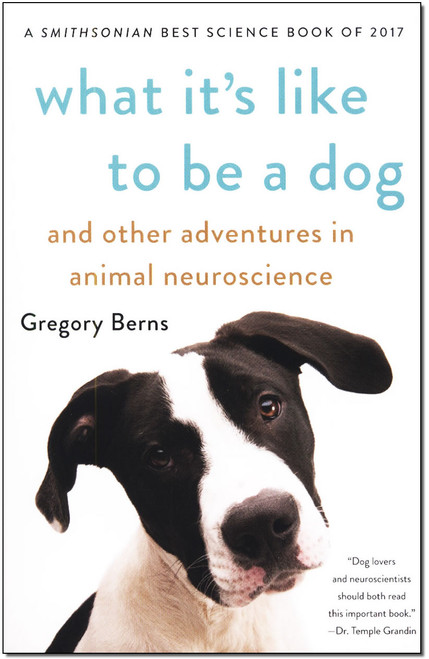Does your dog really love you? Neuroscientist Gregory Berns used an MRI machine to find out.
What is it like to be a dog? A bat? Or a dolphin? To find out, neuroscientist Gregory Berns and his team began with a radical step: they taught dogs to go into an MRI scanner--completely awake. They discovered what makes dogs individuals with varying capacities for self-control, different value systems, and a complex understanding of human speech. And dogs were just the beginning. In What It's Like to Be a Dog, Berns explores the fascinating inner lives of wild animals from dolphins and sea lions to the extinct Tasmanian tiger. Much as Silent Spring transformed how we thought about the environment, so What It's Like to Be a Dog will fundamentally reshape how we think about--and treat--animals. Groundbreaking and deeply humane, it is essential reading for animal lovers of all stripes.
What experts are saying about What It's Like to Be a Dog:
Berns also peeks into the gray matter of dolphins, sea lions, and Tasmanian devils, bolstering his contention that both four-footed and sea-dwelling mammals think and feel much as we do, a sentiment animal lovers and fans of books by Jane Goodall, E. O. Wilson, and Jeffrey Moussaieff Mason will heartily embrace.
-Booklist
The author explains that his purpose in writing this book is 'to raise awareness of the mental lives of the animals with whom we share the planet.' In that, he succeeds. An impressive overview of modern neurology and the still-unanswered issues raised by our treatment of our fellow living creatures.
-Kirkus Reviews
In this big-hearted book, Gregory Berns applies cutting-edge science to questions that have never been so timely: How do other animals perceive their worlds? How do they experience emotions? How does their language work? What It's Like to Be a Dog is a delightful, illuminating look at the minds and lives of our fellow creatures.
-Susan Casey, author of Voices in the Ocean: A Journey Into the Wild and Haunting World of Dolphins
Groundbreaking research that shows that dog emotions are similar to people's. Training dogs to voluntarily lie still in the MRI brain scanner was a brilliant way to explore the workings of their brains. Dog lovers and neuroscientists should both read this important book.
-Temple Grandin, author of Animals in Translationand Animals Make us Human
Gregory Berns is a remarkable scientist, whose pioneering MRI studies of the brain across a range of species have opened up a pathway to deeper understanding of animals' internal awareness and perspectives. He's also an exceptional thinker, whose grasp of the ethical and practical significance of his findings for the status and treatment of animals is pervasive in this absorbing work.
-Wayne Pacelle, President and CEO, The Humane Society of the United States
A fascinating journey towards an understanding of what dogs--and their mammalian cousins--might be thinking about us.
-John Bradshaw, author of the New York Times bestsellers Dog Sense and Cat Sense and the forthcoming The Animals Among Us
Berns has done it again: woven a compelling story with a scientific revolution. Marvelously written and intellectually engaging, What It's Like to Be a Dog will establish Berns as one of the most skilled neuroscientists of our day, as well someone with the intuition that understanding other animals will lead to greater insight and knowledge about ourselves.
-Dr. Brian Hare, New York Times Bestselling author of The Genius of Dogs
Gregory Berns is boldly going where no one has gone before, offering a lively, eye-opening peek into his neuroscience kitchen.
-Frans de Waal, author of Are We Smart Enough to Know How Smart Animals Are?
Dr. Gregory Berns' new book is a fascinating read. Packed with personal stories, What It's Like to Be a Dog clearly lays out just who these amazing beings are, from the inside out. We can now learn what each individual animal wants and needs to have the best life possible in a human-centered world, and what we must do to make sure they do.
-Marc Bekoff, University of Colorado, author of The Animals' Agenda: Freedom, Compassion, and Coexistence in the Human Age and Canine Confidential: An Insider's Guide to the Best Lives for Dogs and Us
Gregory Berns, MD, PhD, is a professor of psychology at Emory University, where he directs the Center for Neuropolicy and Facility for Education and Research in Neuroscience. He is the author of several books, including the New York Times bestseller How Dogs Love Us. He lives in Atlanta with his wife and too many dogs.
1 Review Hide Reviews Show Reviews
-
What it's like to be a Dog
Put your science geek hat on for this fascinating look into the brains of dogs and several other mammalian species. I’m not sure the book lives up to its title of “What it’s like to be a Dog”. A more accurate title might be “What it’s like to be a Neuroscientist”! The science revealed in this book helps to confirm what most dog lovers already intuitively believe; dogs experience thoughts and emotions in much the same ways as humans, based on how dog’s brains respond to various inputs. I’m not sure there’s a lot of information presented in this book which has practical application in dog training or breeding beyond the knowledge that dogs are not just automatons which mindlessly react to stimuli. While the author didn’t outwardly express his views regarding the “rights” of animals, at times he leads the reader toward the conclusion animals should be treated more like persons than current laws require. His reasoning is thought provoking, but more liberal than my own views on the subject. I appreciate that he abstained from going any further into the politics of such controversial topics and instead tended to confine his discussion to the science. A good read if you want to broaden your knowledge of dogs and would enjoy expanding your understanding of neuroscience.








